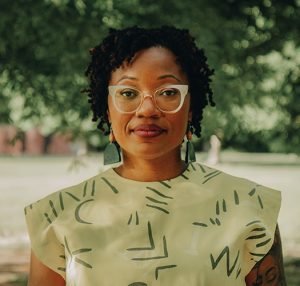This talk draws from previous ethnographic research conducted in Washington, D.C., new research on prison agriculture, and lessons learned from community-based organizations to offer insights into how to create equitable food systems. Specifically, this talk moves beyond the biological imperative of access to healthy food to explore the social and cultural significance of creating meals and eating as one way to explore how we should embrace delight and imagination as core tenets of creating more just food futures.

Dr. Ashanté Reese
About the speaker: Dr. Ashanté Reese is associate professor of African and African Diaspora Studies at The University of Texas at Austin. She earned a PhD in Anthropology from American University and a bachelors of arts in History with a minor in African American studies from Trinity University in San Antonio, Texas.
Broadly speaking, Dr. Reese works at the intersection of critical food studies and Black geographies, examining the ways Black people produce and navigate food- related spaces despite anti-Blackness. Animated by the question, who and what survives?, much of Dr. Reese’s work has focused on the everyday strategies Black people employ while navigating inequity. Her first book, Black Food Geographies: Race, Self-Reliance, and Food Access in Washington, D.C., takes up these themes through an ethnographic exploration of anti-Blackness and food access. Black Food Geographies won the 2020 Best Monograph Award from the Association for the Study of Food and Society. Her second book, Black Food Matters: Racial Justice in the Wake of Food Justice, is a collection co-edited with Hanna Garth that explores the geographic, social, and cultural dimensions of food in Black life across the U.S. Her work has been supported by the National Science Foundation, the Woodrow Wilson Foundation, and the Mellon foundation and has been published in a variety of academic and public venues: Antipode, Human Geography, the Oxford American, and Gravy Magazine among others.
Currently, Dr. Reese is working on a project tentatively titled, The Carceral Life of Sugar in which she explores the spatial, economic, and metaphorical resonance of the plantation in the early 20th century convict lease system in Texas and the ongoing carceral significance of sugar in everyday (Black) life.
About the Justice in Public Health Speaker Series
The SPH Justice in Public Health series is hosted by the SPH Office of Diversity, Equity, and Inclusion and will welcome local and national experts to lead discussion around a wide variety of topics that impact public health and advance health equity.
Who should attend? This series is free and open to the public.
Accessibility. SPH is committed to making its virtual events accessible to everyone, allowing all participants to be fully engaged. To request an accommodation or for inquiries about accessibility, email sphevent@umn.edu. Please make requests with as much advance notice as possible so that the necessary services can be arranged.
Zoom experience. For the best user experience:
- Make sure your Zoom desktop app is updated to the most recent version.
- Log into UMN Zoom to authenticate your Zoom account.

